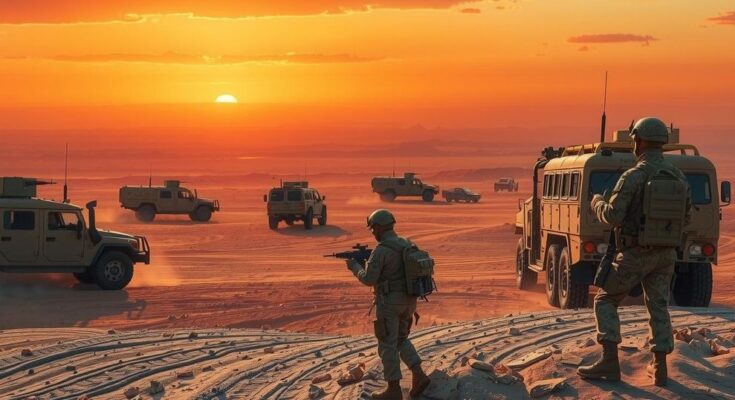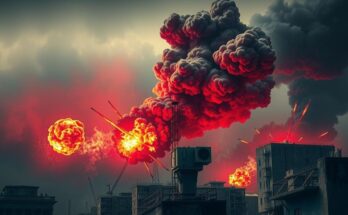Uganda has deployed special forces to South Sudan to protect President Salva Kiir’s government amidst rising tensions that could lead to civil war. The deployment aims to counteract a potential rebel advance and underscores the fragility of the peace process established between Kiir and his rival, Riek Machar. Recent violence has exacerbated fears of instability, prompting international responses and calls for political reform.
Uganda has dispatched an unspecified number of special forces to South Sudan to safeguard President Salva Kiir’s government amid escalating tensions that could lead to another civil war. The troops were sent to the capital, Juba, to counter a potential rebel advance, as stated by Ugandan military spokesperson Maj. Gen. Felix Kulayigye. He clarified that their mission is not peacekeeping but support for the South Sudanese government.
The decision to deploy Ugandan troops reflects President Yoweri Museveni’s role as a guarantor of the peace process aimed at maintaining unity between Kiir and his deputy, Riek Machar. This alliance has historically facilitated Museveni’s interventions in South Sudan to bolster Kiir’s regime. The deployment highlights the precarious situation in South Sudan, exacerbated by ongoing political instability since its independence from Sudan in 2011.
Recently, the United States ordered nonemergency personnel to evacuate Juba, citing concerns over the deteriorating security situation. The United Nations has expressed alarm over a potential regression that may reverse the advancements achieved in South Sudan. The current crisis stems from recent violent clashes in northern regions, primarily involving government forces and a rebel group known as the White Army, which is purportedly allied with Machar.
Last week, violence escalated when a United Nations helicopter was targeted while attempting to evacuate troops, resulting in the death of a South Sudanese general. Earlier skirmishes saw the White Army seize control of a garrison in Nasir, leading to increased tensions in Juba, where army troops surrounded Machar’s residence and apprehended several of his associates, including Deputy Army Chief Gen. Gabriel Duop Lam.
In response to the unfolding events, Kiir urged calm, asserting his government’s resolve to manage the situation and uphold peace. Tensions between Kiir, an ethnic Dinka, and Machar, of the Nuer ethnicity, initially ignited civil war in late 2013, leading to significant bloodshed and instability.
Despite a peace deal signed in 2018 that allowed Machar to resume his position as first vice president, the enduring rivalry between Kiir and Machar poses significant challenges to ongoing peace efforts. Both leaders face increasing pressure from the international community to accelerate the implementation of reforms and prepare for long-overdue elections, which are postponed until 2026 due to delays in critical reform processes.
In summary, Uganda’s deployment of special forces to South Sudan signals a critical juncture in the region’s ongoing struggles with political instability and the specter of civil war. This move, while aimed at safeguarding the current government, underscores the deep-seated divisions and historical animosities between leadership figures. The call for peace and political reform continues as both local and international actors press for adherence to previously established agreements.
Original Source: www.newsday.com




